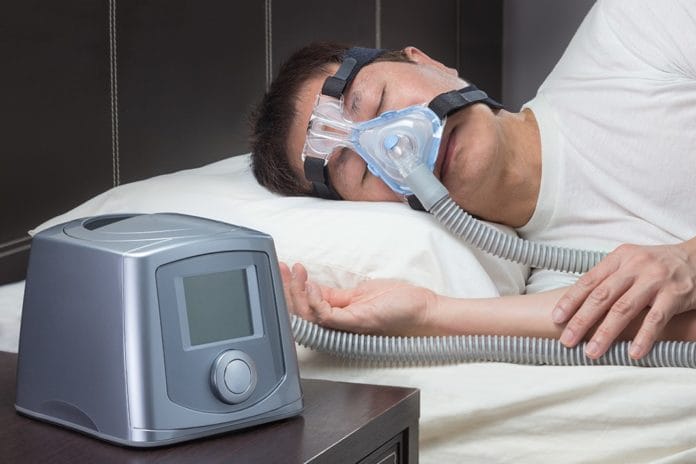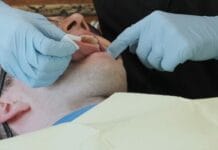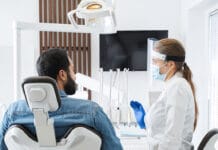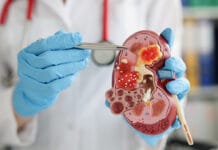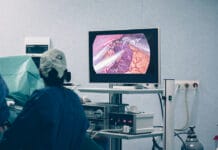Do you find yourself waking up during the night because you snore, and it is affecting you and your partner? Have you ever had to watch your child sleep and fear that your child will stop breathing due to pauses in breathing during their sleep? Snoring and pauses in breathing during sleep can be one of the first signs of sleep apnea. It is estimated that over 18 million Americans suffer from sleep apnea, and over 80% of people are untreated.3
What is Sleep Apnea?
According to the Mayo Clinic, sleep apnea is defined as a potentially serious sleep disorder in which breathing repeatedly stops and starts. Sleep apnea is a sleep breathing disorder characterized by interruptions of breathing during sleep. “Apnea” is a Greek word for “no breathe,” where a person stops breathing for up to 10 seconds with each pause.2 There are many different types of sleep apnea, but the most common is obstructive sleep apnea (OSA).2 If left untreated, it can cause serious medical complications such as heart attack, stroke, and even death.
Symptoms of Sleep Apnea
- Loud snoring
- Teeth grinding or clenching
- Excessive tiredness during the day
- Observed episodes of stopped breathing during sleep
- Constant awakening during sleep due to gasping or choking
- Dry mouth or sore throat
- Morning headaches
- High blood pressure
- Nighttime sweating
- Depression, mood swings, or irritability
Research shows that you may have an increased risk of sleep apnea if you have diabetes, high blood pressure, or are considered overweight.6 You can have one or more of these symptoms and suffer from mild to severe sleep apnea. If you suffer from any of the symptoms, ask your doctor or dentist about sleep apnea. Detecting this condition can improve your health, your daily activities, and your mental and physical wellbeing. It can even increase your lifespan.
How to Treat Sleep Apnea
The most effective way to treat sleep apnea is with a CPAP machine. But many people cannot tolerate the machine, and other options are available. The next option could be a dental sleep apnea appliance from your dentist. Many dental professionals are trained in treating sleep apnea, and dental professionals are experts and highly qualified to check your mandible for an optimal airway.
As dental hygienists, we are trained to provide an extra- and intraoral exam on the head and neck during hygiene visits. With this exam, we are able to check for visual signs and symptoms that could potentially cause this condition. We look for signs of grinding and clenching of your teeth, and we check the size of your tonsils and uvula to see if they are enlarged and blocking the airway. We check for swollen lymph nodes, and we check your medical history for diabetes and high blood pressure. We will also ask if you snore or have ever had a sleep test done − a polysomnography.
After the dental hygienist’s evaluation, the dentist will review findings prior to their examination. This helps our dentists to evaluate if the patient would benefit to have a sleep test done, which can be done at home or in a medical facility. Once results come back, dentists can decide if a dental sleep appliance would be a viable solution.
What is a Dental Sleep Appliance?
A dental sleep appliance is called a mandibular advancement device (MAD). It looks a mouthguard that people use when they play sports. But this device snaps over the upper and lower dental arches and has metal hinges that make it possible for the lower jaw to be moved forward, which helps to open the airway. Some appliances allow the dentist to control the degree of advancement.4
This is a great alternative for those who cannot tolerate a CPAP machine. It also can be another less invasive way to prevent having surgery to open up the airway. The American Academy of Dental Sleep Medicine recommends that if you get fitted for a dental sleep appliance, you will want to make sure you get regular checkups to make sure it is working and for adjustments if needed.5
There are some disadvantages with wearing a dental sleep appliance. But the small disadvantages outweigh the chance to relieve airway blockage. The impediments may be dry mouth, excessive salivary flow, soreness, or maybe a slight change in your bite. These can be adjusted and improved with your dentist’s help.
The goal of a dental sleep appliance is to open your airway so you can breathe better at night and get better quality sleep. Many medical (not dental) insurance companies can help with the cost of this dental sleep appliance treatment if proper medical information and determination are sent to their medical insurance company.7
Sleep plays a vital role in good health and wellbeing. During sleep, our bodies work to fight infection and work to support healthy brain function. It also helps to maintain better physical health. Sleep deprivation, over time, has been associated with a shortened lifespan. Your dental professional does not just provide a healthy smile or optimal oral health; they can improve your overall health. So if you believe that you may suffer from sleep apnea, ask your dental professional about any sleep apnea concerns, so you can enjoy a good night’s sleep and add some extra years to your life.
Now Listen to the Today’s RDH Dental Hygiene Podcast Below:
References
- Do I Have Sleep Apnea? American Sleep Apnea Association. Retrieved from https://www.sleepapnea.org/
- Medical Definition of Sleep Apnea. Retrieved from https://www.medicinenet.com
- Obstructive Sleep Apnea. Mayo Clinic. Retrieved from https://www.mayoclinic.org/diseases-conditions/obstructive-sleep-apnea/symptoms-causes/syc-20352090
- Mouth Devices for Sleep Apnea. WebMD. Retrieved from https://www.webmd.com/sleep-disorders/sleep-apnea/mouth-devices-for-sleep-apnea#1
- American Academy of Dental Sleep Medicine. Retrieved from https://aadsm.org/
- The Dangers of Uncontrolled Sleep Apnea. Johns Hopkins Medicine. Retrieved from https://www.hopkinsmedicine.org/health/wellness-and-prevention/the-dangers-of-uncontrolled-sleep-apnea
- Does Medical Insurance Cover Oral Appliances for Sleep Apnea and Snoring? Dental Sleep Practice. 2017 June 17. Retrieved from https://dentalsleeppractice.com/articles/medical-insurance-cover-oral-appliances-sleep-apnea-snoring/

